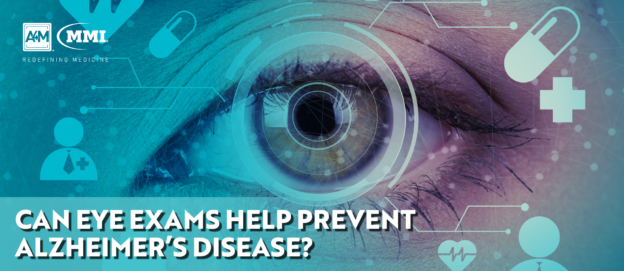Often performed on aging patients at risk of serious eye conditions such as blindness, eye exams may soon prove to be powerful tools in the detection of brain disease. As a practical, preventative measure, eye examinations assist physicians in observing and determining the deterioration of eye health in aging patients, helping to protect against crippling impairment. It is estimated that nearly 50% of blindness cases can be avoided or prevented with routine visits to an eye care professional, according to Harvard Health Publishing
Not only do regular eye exams allow for the close monitoring of visual health, but they also show promise of providing practitioners with a better understanding of patient brain health, even before any noticeable symptoms are present. Early detection of eye conditions is essential to suppressing disease progression and improving patient outcomes – as is the case with brain disorders such as Alzheimer’s disease (AD). Common eye conditions such as glaucoma, age-related macular degeneration, and diabetic retinopathy are increasingly being linked to the risk for Alzheimer’s disease and other forms of dementia, as claimed by the latest research.
Associations Between Eye Conditions and Alzheimer’s Disease
Conducted by researchers at the University of Washington, Seattle, a recent study aimed to identify the correlation between several eye conditions and corresponding risk of Alzheimer’s disease. Led by Dr. Cecilia Lee, the team analyzed data from the Adult Changes in Thought study (ACT) – an examination which began in 1994 and followed over 5,000 dementia-free adults until they decided to leave the study, died, or developed dementia.
Focusing on nearly 4,000 participants, both with and without eye disease at the beginning of the study, researchers evaluated the data set to determine the hazard ratio for developing probable or possible Alzheimer’s disease. Diagnoses of glaucoma, age-related macular degeneration, and diabetic retinopathy were separated into two groups: recent (within 5 years) and established (over 5 years), and their association with AD risk was assessed. Of the selected cohort, 792 patients developed dementia.
An increased risk of Alzheimer’s disease was reported for patients with recent glaucoma diagnoses, established age-related macular degeneration, and both recent and established diabetic retinopathy. Study authors found that participants with recent, and not with established, glaucoma diagnoses were 44% more likely to develop dementia. The difference between new and existing cases remains unclear. Diabetic retinopathy also contributed to a 44% increase in the probability of dementia development, while patients with age-related macular degeneration were 20% more likely to develop the disease. The common age-related eye condition of cataracts had no apparent connection to dementia risk, according to the study’s authors.
Study findings implicate a plausible connection between the three eye conditions and Alzheimer’s disease and dementia, indicating they may all have a joined etiology.
Eye Conditions Linked to Cardiovascular Disease
A common causative factor underlying the association between eye disorders and AD could be cardiovascular disease, as all three visual conditions have been linked to heart health. Marked by increased pressure in the eye that can lead to vision loss, glaucoma has been linked to high blood pressure, diabetes, and poor circulation. High blood glucose levels have been found to damage the blood vessels in the retina, linking diabetic retinopathy to cardiovascular problems while age-related macular degeneration has also been linked to heart disease.
Eye Exams for Alzheimer’s Prediction and Prevention
The apparent close correlation between the three eye diseases and neurodegenerative activity calls for further research on the potential efficacy of eye examinations for Alzheimer’s disease risk prediction and prevention. Although Dr. Lee’s recent findings are promising, health care practitioners are not yet able to rely on eye exams as accurate measures for determining the risk of AD and other types of dementia or to prevent these conditions from developing. However, routine eye examinations are valuable in detecting eye diseases in their earliest stages, speeding up the course of treatment and greatly improving patient health outcomes.
Current testing procedures for Alzheimer’s disease, including PET scans and lumbar punctures, are expensive and invasive which may contribute to delayed diagnoses, especially as the disease can progress asymptomatically for years. As this recent study reveals, regular eye examinations have the potential to identify certain ophthalmic diseases which may contribute to increased risk of Alzheimer’s disease. The growing understanding of the connection between three specific eye conditions and AD risk may lead to the development of improved screening methods, promoting early detection and better identifying those at risk of developing dementia.

